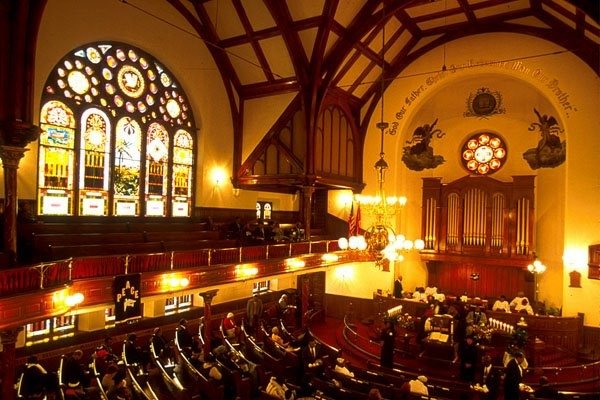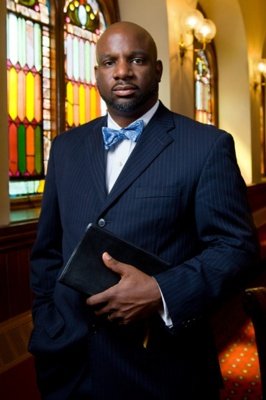
October 08, 2015
 Photos courtesy of www.motherbethel.org/for PhillyVoice
Photos courtesy of www.motherbethel.org/for PhillyVoice
Mother Bethel African Methodist Episcopal Church
True or False: Your spiritual beliefs, and the ways in which you choose to demonstrate them through your actions, ultimately affects us all.
It’s true, you know.
As an adult and parent witnessing the severe consequences of a world often intolerant of differing faiths (“the others”), I believe it’s become extremely important to raise children who are independent thinkers capable of being tolerant of others’ beliefs and perspectives. I NEVER want my children to miss out on the blessing of learning from someone who doesn’t think or believe as they do.
Case in point: the pope just made a historical visit to our city and although my children and I are Christian, I had an in-depth conversation with them about who he is, what Catholicism and the World Meeting of Families [are] about, and why the visit was a big deal.
My commitment to becoming a living example of love - along with a desire to impact my community and the world for the better - led me to meet the Rev. Mark Tyler, senior pastor of Mother Bethel African Methodist Episcopal Church. Rev. Tyler serves as co-chair of the Clergy Caucus within POWER (Philadelphians Organized to Witness Empower and Rebuild).
POWER unites congregations from across the city and intentionally brings people together “across the lines of race, faith, income level and neighborhood” for the purpose of driving an interfaith movement. Their mission is to organize and empower Philadelphians for the purpose of transforming the conditions of neighborhoods, and moving the needle on quality-of-life issues.
I recently chatted with Rev. Tyler about the importance of tolerance and the value of an interfaith perspective on life, especially here in diverse Philadelphia. Stay tuned for the next Conversations with a Kids piece, where I’ll explore my eldest daughter’s (she’s 10) thoughts on tolerance for other religions, beliefs and perspectives.
Martin: In your opinion, what is the value - if any - of an interfaith perspective on life?
Tyler: Interfaith experiences can sometimes actually deepen your own faith. For example, within POWER, I work with a number of rabbis, a couple of imams, and the other co-chair is a rabbi in the Reconstructionist Movement for the Jewish faith, which is kind of the progressive end of Judaism. To hear a rabbi’s take on what we view to be the Old Testament, [it] sometimes gives you a whole different way of thinking about it.
Martin: How so?
Tyler: For example, we begin every meeting with a faith reflection — it’s not necessarily a sermon, but it's five minutes or so of whatever is in their heart. The rabbi [was] speaking and used the book of Esther as a reason to be involved in social justice. She [said] that God is not mentioned at all in the book of Esther and it’s the only book in the Old Testament where God is not mentioned. So why would it be included? A part of that explanation for her was that the lack or absence of God means that it was on Esther, or people to do the work -- [essentially] ‘God’s not going to save you this time, you have to do it yourself.’ I would not have even had that perspective [on that book] if not for this interfaith relationship. So it can be very valuable to strengthen your faith.
Martin: In what ways do you hope the interfaith movement will influence the way we as Philadelphians interact with one another?
Tyler: It starts with access to jobs that pay a wage that people can actually save and raise a family. That then helps in the process of educating children, keeping people out of jail, keeping a roof over our heads and helping with access to health care. The big win of raising the minimum wage in the city; we (POWER) were an integral part of that with Councilman Goode’s legislation and pushing it. We go to bat for people who don’t have time [due to jobs], or don’t know how to articulate it or are afraid to do so. Now people who work at the airport are making $12 an hour as baggage handlers and wheelchair workers, when before July 1, they were making $7. That is a part of this interfaith movement. In the Christian faith we say, “faith without works is dead.” We believe that in organizing as well: you can’t talk about your faith-based work but then have no works to demonstrate what you believe in.
Martin: In keeping our youth in mind, why is it important for this interfaith perspective to be instilled at a young age?
Tyler: Look at the world. One of the greatest dangers facing the world in my opinion is intolerance and religious intolerance. This idea that somehow the answers to the world’s problems lie in “getting rid of folk who don’t think like me” -- it’s driving people to commit heinous acts in the name of God, no matter how they choose to call God’s name. For me, the way to salvation is through Jesus Christ, but my Muslim brother in POWER, that’s not for him the road and that’s not the same road for my Jewish rabbi’s sister that I work with. We respect the fact that we can have these differences and these differences don’t have to create a fence and a wall and keep us apart.
Martin: And oh the fences we have in place, the fences that divide our children …
Tyler: They’re inheriting a world that is closer by social media than it has ever been, and at the same time, it seems to be that [we’re] growing further and further away from each other because of differences. I hope that interfaith experiences can really be a model for young people — that they grow up in a place that is different, [where] you don’t have to kill somebody just because they aren’t on the same page as you.
Martin: Are there any suggestions or advice that you would give to parents or caregivers in regards to teaching interfaith principles through action?
Tyler: Find real experiences that you can share. I’ve preached in synagogues, spoken in synagogues so [my kids] go with me and see things that a lot of their friends don’t see. It’s always funny afterward because they’re at that age where they’re making connections and asking questions. When we went to the synagogue, they were really surprised at how much music played a role in worship like our service; the service was almost exclusively about music and the message. They walked away and could at least appreciate the fact that [their] worship felt like worship feels for us. Find places to take your kids and let them experience it first hand, and don’t be afraid that “somehow this religion will take my kid away from me.”
Martin: How can adults make sure that we are not putting up a wall or fence to other faiths?
Tyler: Begin by looking at yourself and thinking about your own experiences. [Ask yourself] Am I living a life that is open to being around different kind of people? You have to be intentional about some of that. Joining POWER was a conscious decision and I joined it knowing up front that it was going to be interfaith, interracial, and inter-almost everything else. I put myself in that place. For me, the bottom line is that there are not enough people of goodwill in the world to begin with — not the ones who are really going to fight for what they believe is right. So, we don’t even have enough people to start putting up barriers and we tend to have a frame of reference that is: “What is the closest thing that identifies to me?” That leaves you narrow-minded and missing out on all that the world has to offer.
